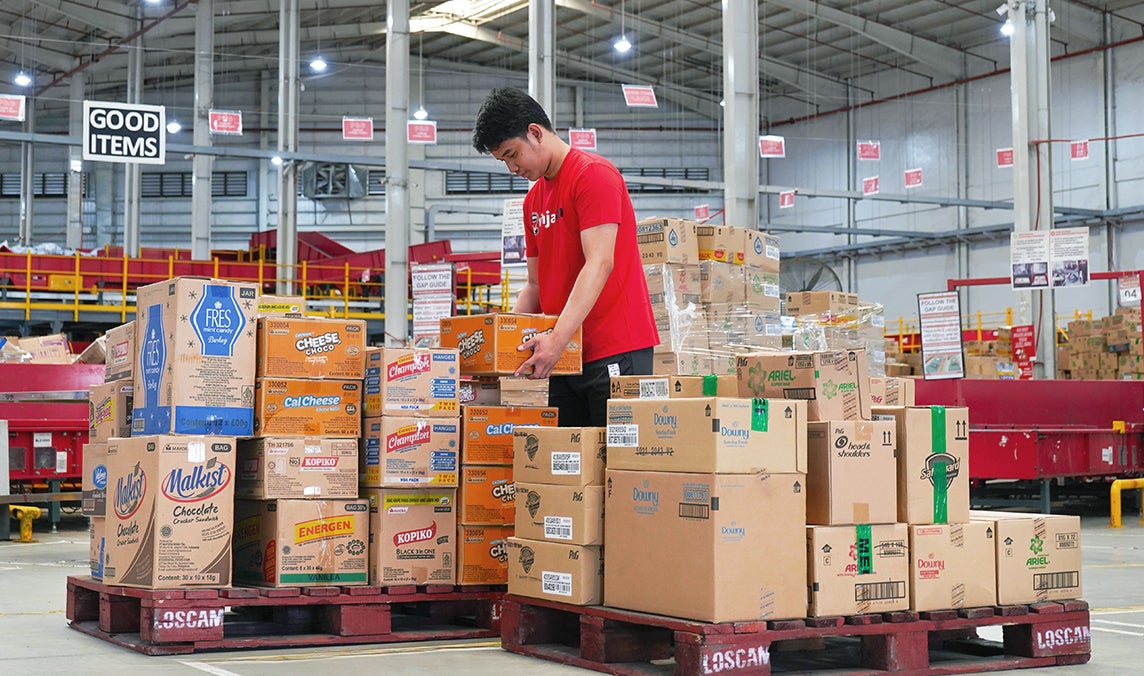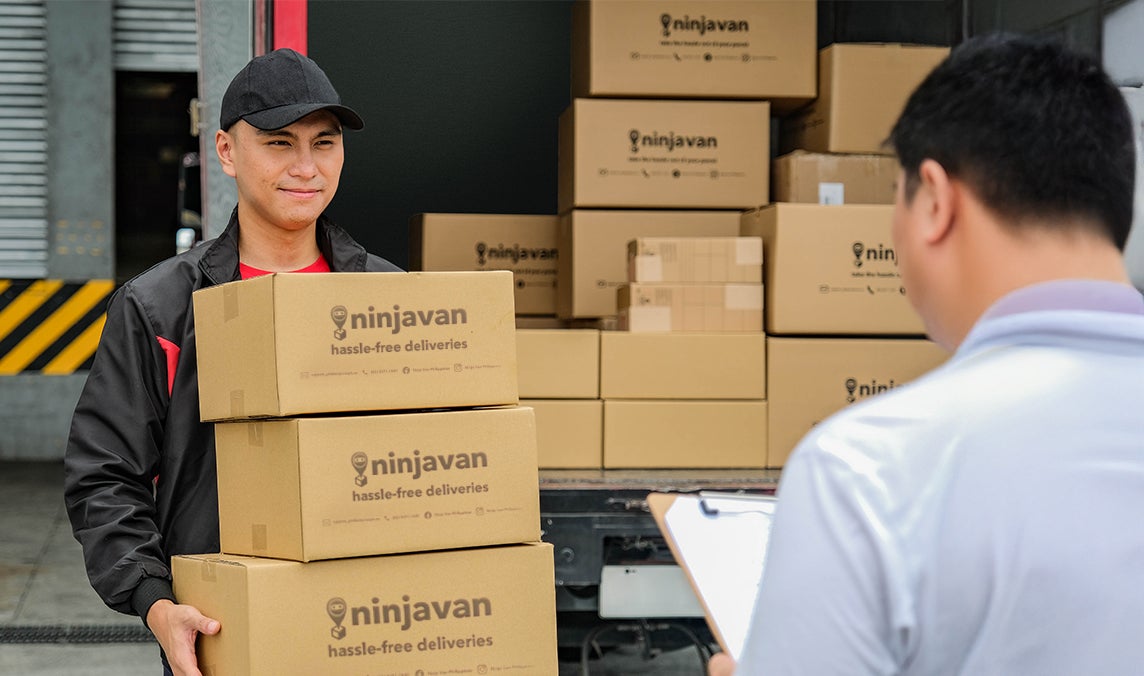Why Co-Loading is the Future of B2B Delivery
.webp)
Some challenges can inevitably disrupt business flow. In the Greater Manila Area—where the demand for efficient, cost-effective logistics is higher than ever—shipping can be a pain point. Sometimes, you don't need a whole truck to deliver just a few supplies but must pay for the whole price of one.
That's where co-loading comes in. It helps lower shipping costs, uses space better, and makes deliveries consistent and more reliable. It's a smart way to make logistics more flexible and efficient.
Here's your guide on co-loading shipping, its benefits, and why it's the future of business-to-business delivery.
What is Co-Loading?
Co-loading is a shipping option for sharing one delivery truck and route with other businesses. Sharing a single vehicle can help you and other companies save on shipping costs, reduce parcel delivery times, and enhance supply chain processes.
While co-loading works best for similar shipments or compatible product types, it can also accommodate diverse goods as long as the delivery route aligns.
Co-loading is similar to less-than-truckload (LTL) shipping, except the latter involves filling a truck with shipments from various businesses but may involve multiple stops at distribution centers. It may take longer and require more handling than co-loading, which involves strategic planning for greater efficiency.
Types of Co-Loading Arrangements
There are two types of co-loading:
- Passive (Opportunistic) co-loading happens when the timing, shipment size, and destinations of shipments align naturally, allowing companies to share a delivery truck without additional planning.
- Active (Planned) co-loading involves deliberate coordination between businesses to adjust shipment sizes, timing, and routes for optimal efficiency. While it can result in greater cost savings, it requires more effort to organize and may influence inventory planning.
The Benefits of Co-Loading for B2B Delivery

As your business grows, choosing shipping solutions that provide high efficiency while driving cost savings is increasingly essential. Co-loading can meet these needs, providing the following benefits that make it an excellent option for B2B deliveries.
Cost friendliness
There will be times when you don't need the space of an entire truck for your delivery needs. Fortunately, co-loading lets you share delivery costs with other businesses, paying only for the space your shipment occupies rather than the cost of an entire vehicle.
This way, you can stay competitive and efficient with timely shipments without overextending your budget. Co-loading is especially beneficial if you're a small- to medium-sized business managing limited funds.
Improved efficiency
Co-loading consolidates shipments with similar destinations and optimizes delivery routes. This approach reduces the number of trips required, saving time and fuel. It also means faster delivery times and fewer logistical bottlenecks.
Suppose you own a clothing business in Pasig and need to deliver boxes of products to Quezon City. You can share a delivery truck with another company using a similar shipping route.
Sustainability
Like other businesses that focus on recycling and selling zero-waste goods to lessen their carbon footprint, you can do the same with co-loading shipping. It minimizes the number of vehicles on the road, which directly translates to fewer emissions.
Co-loading is a good way to reach your sustainability goals while maintaining productive operations.
Scalability
Do you see more demand during the holidays or other seasons? Co-loading gives you the flexibility to adjust your shipping without overcommitting resources. It lets you handle shipments logically during busy times or fewer during slower months or when you face unpredictable inventory and delivery demands.
Optimized inventory management
Frequent and predictable deliveries through co-loading can transform your inventory management. Instead of overstocking to compensate for infrequent deliveries, you can maintain optimal stock levels. It lowers storage costs and minimizes the risk of product loss or waste, which is particularly helpful if you deal with perishable goods.
Real-World Use Cases of Co-Loading
Co-loading is a versatile solution that many businesses, including yours, can benefit from. Here are some examples of how it works in various industries.
Retail chains
Retail chains often require regular deliveries to multiple store locations. With co-loading, you can combine shipments for stores in the same region into a single delivery route.
For example, if you have a chain of electronic stores across Metro Manila, you can opt for co-loading to restock inventory at multiple branches in one trip. Instead of sending separate shipments for each store, you can combine shipments of products like smartphones, laptops, and TVs currently low in stock.
This way, you can reduce transportation costs and ensure timely stock replenishment. You can also maintain optimal inventory levels and meet customer demands efficiently.
Food and beverage
The F&B industry frequently deals with temperature-sensitive goods that require specialized handling. A 2022 study found that lack of proper storage facilities and poor transportation infrastructure are leading causes of food loss.
Luckily, co-loading optimizes delivery routes. It consolidates your shipments with other businesses while maintaining the integrity of perishable goods through cold chain logistics.
Let's say you run a bakery delivering fresh bread. You can share a truck with another company that needs to deliver perishable goods. Then, you can save costs while ensuring your products arrive fresh and on time.
FMCG (Fast-moving consumer goods)

Consumers often prioritize food and personal hygiene products when buying groceries, especially during "petsa de peligro." That's why FMCG businesses restock constantly. With co-loading, you can combine shipments for multiple retailers or distributors in the same area.
For example, if you're a manufacturer of packaged snacks, you can split the costs of a truck with a beverage company delivering to convenience stores in the area you serve. This approach ensures faster deliveries, lowers costs, and reduces the environmental impact of multiple delivery vehicles.
E-commerce businesses
Online businesses have slow days, too, and shipping just a few items can be costly. Co-loading solves this problem by offering a flexible way to manage shipments.
For example, you can share delivery space with other businesses during low-volume periods to keep costs low. Co-loading can scale up to handle larger shipments efficiently when demand spikes, like during sales or holidays.
Common Misconceptions of Co-Loading
Despite its growing popularity in the logistics industry, many businesses still don't know what co-loading is and how it works. Here are some common misconceptions about it.
Causes delays in delivery
You may think sharing delivery routes with other shipments might slow your deliveries. In reality, co-loading combines shipments with similar destinations into a single delivery route to optimize trips and reduce unnecessary stops.
Carefully planning routes and strategically grouping shipments prevents delays and improves overall delivery efficiency.
Ninja Restock minimizes delays through strategic hub placements, custom-designed routes, and tailored transportation methods suited to your shipment needs. These features ensure faster and more reliable deliveries while keeping the process smooth and optimized.
Increases the risk of damaged goods
With other businesses' products in the same truck, you might worry about yours becoming damaged in transit—especially small and fragile goods.
However, co-loading doesn't compromise the safety of shipments. Your logistics provider groups shipments strategically, often by similar handling requirements, to transport everything safely.
Ninja Restock lowers the risk further thanks to its digital dashboard and real-time parcel tracking. With us, you gain visibility into your shipment's journey. We tailor transportation methods to suit the specific requirements of your goods.
Only for small businesses
Regardless of whether you're a small business sending a few shipments or a larger enterprise managing fluctuating demand, co-loading can scale to meet your needs. By combining shipments with similar destinations, this shipping option fine-tunes delivery routes, reduces costs, and enhances productivity—regardless of shipment volume.
Fortunately, nationwide coverage across Southeast Asia, tailored transportation methods, and flexibility to adjust for seasonal demand make Ninja Restock an excellent solution for scaling logistics. Whether you're growing or managing high-volume shipments, Ninja Restock ensures reliable, efficient, and cost-effective deliveries.
Co-loading is incompatible with urgent deliveries
If you deal with time-sensitive shipments, you might think co-loading isn't fast enough to meet your needs. However, co-loading can handle urgent deliveries effectively when managed correctly.
Ninja Van prioritizes time-sensitive shipments within the co-loading model. With strategic planning and optimized routes, your urgent goods are delivered promptly, ensuring your business runs smoothly despite tight deadlines.
Limits control over shipments
Co-loading may mean losing control over your logistics, as your shipments are grouped with others. This lack of oversight can concern you regarding visibility and control.
That's why Ninja Van provides dedicated account managers to support you. These experts act as your point of contact, ensuring you have control over your shipments. With personalized support, you'll stay informed and confident throughout the process.
Not suitable for sensitive goods
If you ship sensitive or perishable goods, you might think co-loading isn't an option. After all, fresh produce or pharmaceuticals require special handling and conditions.
Ninja Van's cold chain logistics service, Ninja Chill, addresses this challenge. With temperature-controlled solutions, we transport your sensitive goods under optimal conditions so they arrive in perfect shape.
Co-loading is complicated to implement
The thought of integrating co-loading into your existing operations might feel overwhelming. Planning routes, coordinating with other businesses, and adjusting your logistics can seem too much to handle.
Ninja Van makes co-loading easy with personalized solutions and dedicated account managers. We handle the logistics planning for you, simplifying the entire process. From implementation to day-to-day operations, Ninja Van ensures a frictionless experience so you can focus on growing your business.
Streamline Your B2B Logistics with Ninja Van

Co-loading is changing how businesses handle deliveries—it's cheaper, faster, and more flexible. Whether you're a small business looking for an affordable delivery service or a large one seeking efficient shipments, co-loading is your best option today.
With Ninja Van's personalized services like Ninja Restock, you can easily save costs and improve your supply chain. We're here to help you optimize your logistics and make your operations smoother.
Visit our logistics solutions page and follow us on social media for more updates!

